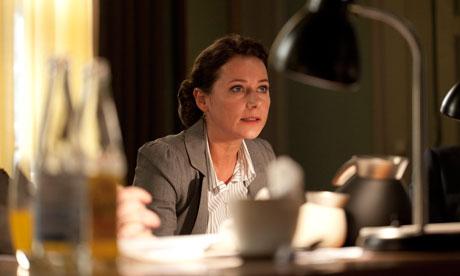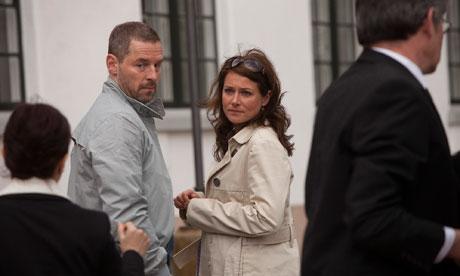[Janet McCabe, about to become a TVWW regular, reports from England about Borgen, a Danish import about to be remade by NBC, and shown here in its original form on Link TV. She calls it the next West Wing... - DB]
By Janet McCabe
CST Online
I keep hearing about the demise of television. I hear it; I don’t believe it. I do, however, seem to watch an awful lot of it – and television that continues to prove that news of its demise maybe somewhat premature. Not allowing myself to wallow too long following the ending of The Killing II, I plunged almost immediately into watching its replacement, Borgen. There might not have been a thread of Faroe knitwear in sight, but the political shenanigans of Danish coalition politics remained.
There have been the inevitable comparisons with the NBC behind-the-scenes political series, The West Wing. Given the density of the language delivered at a brisk pace, the Washington-based show about the denizens of 1600 Pennsylvania Avenue never did good business in territories where subtitling predominates, like the Scandinavian and Benelux countries. The West Wing, true to form, didn’t prove popular in Denmark, only ever finding a small elite 'art house' audience for its politics. Borgen nevertheless shares (albeit differently) the same impulse to engage in a broader public debate about political power and idealism.

Whereas the Bill Clinton/Monica Lewinsky scandal stoked a weary public skepticism of politicians and political institutions when The West Wing first aired, Borgen (literal meaning castle or fortress, but the Danish term for their parliament) debuted in Denmark at a time when Danes were suffering a crisis of faith in democratic politics. After 10-years of a right-wing coalition led by Anders Fogh Rasmussen (leader of the Liberal Party, Venstre), which saw Denmark enter the wars in Afghanistan and Iraq (the first armed conflicts in which the country had been engaged for over a century), the Danish political psyche found itself struggling to reconcile events with its humanistic idealism. It is certainly an issue with which Killing II wrestled; enter Borgen.
Its aim, as reported by Annette K. Olesen, one of the Borgen directors, was to get people interested in politics again. In keeping with the public service broadcast agenda at DR (Danish Radio), the series sought to offer insight in to how Danish democracy worked and communicate that information to an audience in a dramatic way. It certainly did; but what surprised the Borgen production team most is how well the series travelled beyond the Danish borders.
Politics has never been a popular topic for drama; TV schedules are littered with the causalities of political shows unable to find a viewing constituency. Borgen proves an exception, finding strong popular support at home. The machinations of coalition politics, with its intrigue and instability, are tightly drawn. Opening with a quote from The Prince by Machiavelli, the series begins its story days before a general election, in which Brigitte Nyborg (Sidse Babett Knudsen) and the party she leads must make uneasy alliances with the political left and right, as well as smaller, more extremist parties, to secure (and later maintain) power. Nothing is easy. Borgen has a lot of business to get through and is never afraid to dispatch a narrative thread that could yield for weeks on end. Weaving compromise of political expediency and higher ideals, the series creates drama packed with ambiguity and moral complexity, in which political (and private) outcomes are never the first choice, or often the right one, but the best that can be achieved in the circumstances.

Not since CJ Cregg screamed at a silent, if not defiant, Nancy McNally over the moral relativism of US foreign politics in trading with a nation that sanctioned violence against women have I been quite so excited about women in politics. Move over, CJ; make room for Nyborg. Kim Akass talked about her several weeks ago, and for good reason; Nyborg is certainly someone who commands our attention. Married with children, balancing family with a demanding career, Nyborg strikes a chord. But more than the gender politics, her character speaks of how to reconcile idealism with power, dogged integrity with political duty. She makes visible the collateral damage involved in the political as personal, while revealing all too painfully the compromises that must be made along the way.
So in the interests of furthering the cause of European integration, come on, BBC: don’t make us wait too long for series two. Saturday nights aren’t the same without our fix of Scandinavian political intrigue.
--
Janet McCabe is Honorary Research Fellow in TV Drama at Birkbeck, University of London, as well as Research Assistant (Critical Studies in Television) based at the University of Glamorgan. She has (along with Kim Akass) co-edited several collections, including Reading Sex and the City (2004) and Quality TV: American Television and Beyond (2007), with their latest collaboration, TV Betty Goes Global, published this November. She has written widely on feminism and television, and her book, The West Wing, for the TV Milestone Series, is forthcoming. For more, visit the CST Online website.